Field Artillery Regiments at Camp Devens - 1918
THE FIELD ARTILLERY
Camp Devens has three regiments of field artillery: the 303rd, heavy artillery, the 301st and 302nd, light artillery. Colonel A. S. Conklin is the commanding officer of the combined regiments. The enlisted men are those drafted from Northern Maine and New Hampshire.
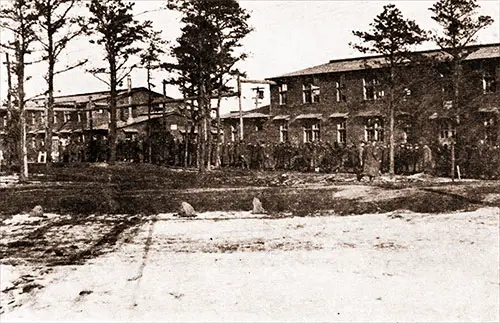
Men from Battery F, 303rd Heavy Field Artillery. Barracks Shown in Background. GGA Image ID # 13a351f4ab
Battery F, 303RD. H. F. A. - Captain Gallaudet of Waterbury has just ordered his organization, Battery F, to fall in for fatigue duty. It is early afternoon, and the entire regiment is about to pick up the grounds and do odd jobs in the vicinity.
A quarter-mile away, there is a huge supply of wood, scattered promiscuously over the landscape; these boys from the north will spend the afternoon gathering and placing it in piles for the trucks to distribute.
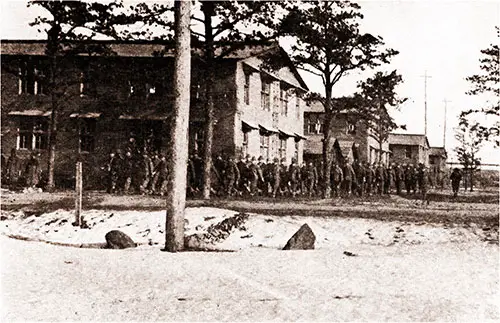
Men from Battery D, 303rd Heavy Field Artillery Wear Blue Overalls to Keep Their Uniforms Clean. GGA Image ID # 19c89fb73e
At the same time Battery D is rounding the corner. A road not far away must be opened before night and the soldiers have donned blue overalls to keep their uniforms from getting dirty. They surely present a strange appearance, with their campaign hats and the blue, loose-fitting clothes, in place of the regulation khaki.
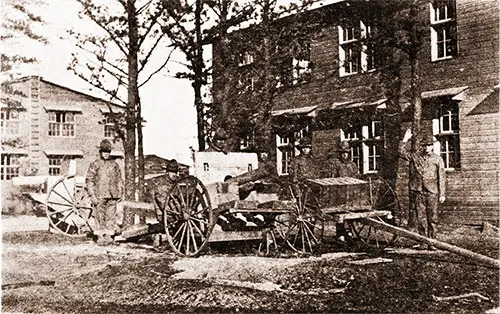
Artillery Practice for a Squad from Batter E, 303rd Heavy Field Artillery Under Watchful Eyes of Lt. Julian L. Lathrop. GGA Image ID # 13a3956b2d
Lieutenant Julian L. Lathrop, the former Harvard athlete, who has been in the ambulance service at the Western Front, is drilling a squad from Battery E. In the absence of horses and artillery, they use wooden imitations and themselves drag the “big guns” around.
They are now ready to fire; there is a goodly supply of theoretical ammunition in the wooden caisson at the right of the gun, and the sergeant is about to give the signal which will (also theoretically) cause a shell to disturb the peaceful quiet of the town of Clinton, ten miles away.
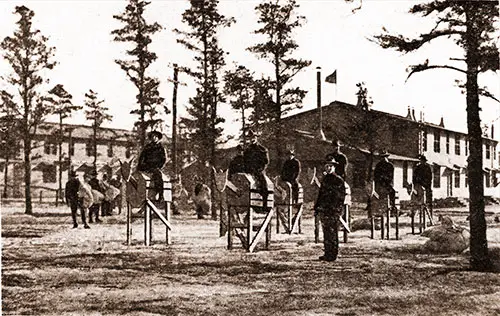
Squad from Batter E, 303rd Heavy Field Artillery Learns the Gentle Art of Equestrianism Under Watchful Eyes of Lt. Julian L. Lathrop. GGA Image ID # 13a41fde99
On the “camouflaged” horses the same squad is learning the fine points of equestrianism. When the genuine articles arrive, all that will be necessary will be to get on good terms with the animals.
CAMP ACTIVITIES
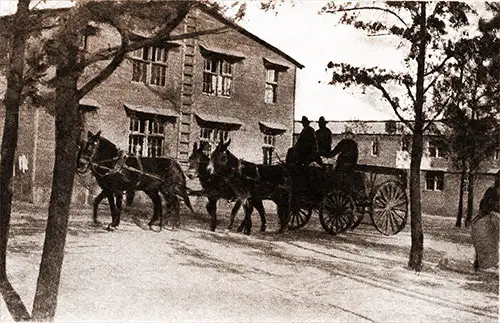
Supply Team from the 303rd Heavy Field Artillery. GGA Image ID # 13a7a8fab2
The Supply Team Once more we have one of the mule teams; this one is an adjunct to the Supply Company of the 303rd H. F. A. The transportation and distribution of company supplies comes within the province of the supply company, a unit which is attached to each regiment.
The men usually selected for this organization are those who have had previous experience in taking care of horses and mules, or in driving carts. In the regular army, the supply men have the longest working hours of any enlisted men in the service.
Directly after breakfast, they harness their teams and drive away; they do not appear again at their quarters until supper time.
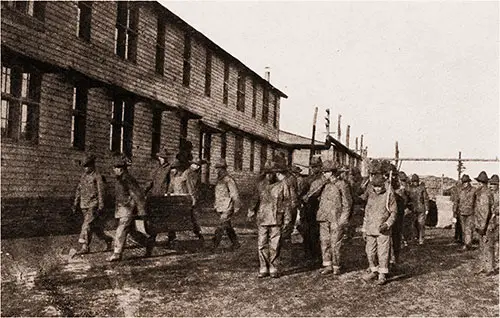
Men from the 302nd Field Artillery Shown Policing the Grounds of Camp Devens. GGA Image ID # 19c8d326f2
Policing the Grounds The word “police,” taken as a verb, means, in military parlance, to “clean up.” The “policing” of a mess hall signifies the sweeping of the floor and washing of the tables. The “policing” of the camp grounds denotes the cleaning up of all papers and rubbish in the vicinity.
Two men carry a box or a sack for the refuse; the rest pick up every scrap which might arouse the wrath of the vigilant inspector or sanitary officer. Here we have a group of men from the 302nd Field Artillery. putting their grounds in good order for an expected inspection by the colonel.
